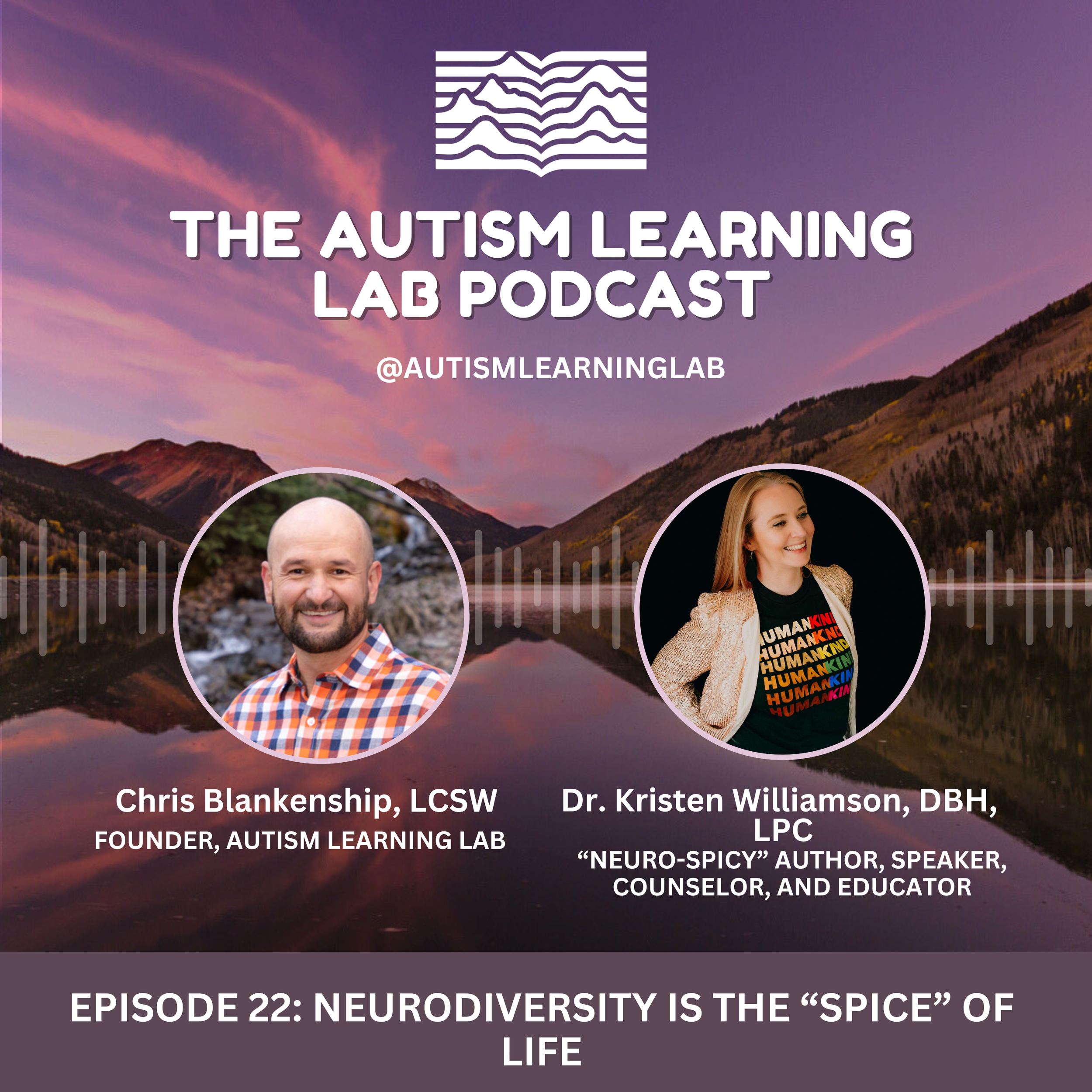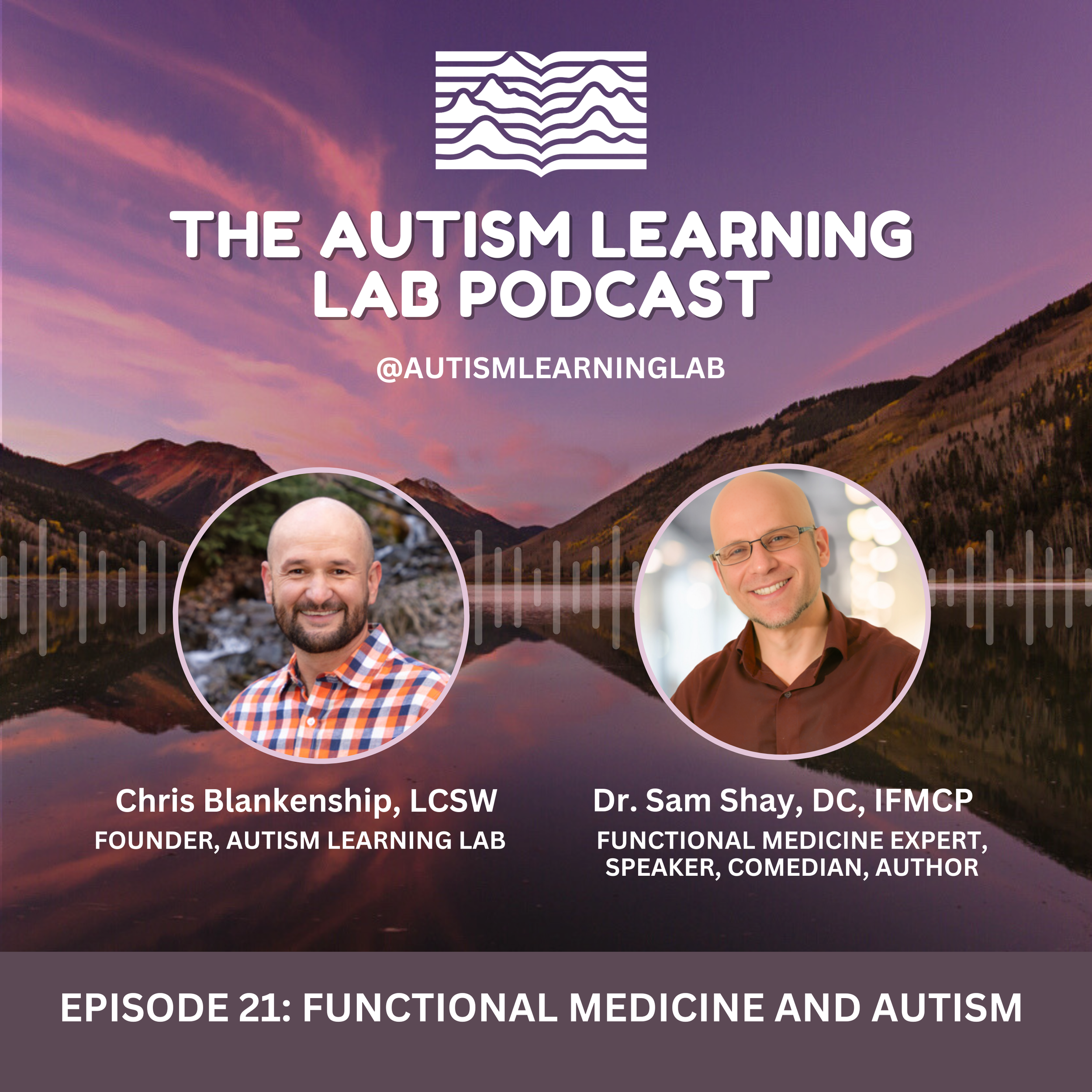
Autism Learning Lab Podcast: Insights, Strategies, and Support
Join us as we explore the world of autism through expert interviews, personal stories, and actionable strategies to empower individuals and families.

EP 22: Neurodiversity is the “Spice” of Life
Chris welcomes Dr. Kristen Williamson—a “neuro-spicy” licensed professional counselor, behavior health consultant, and unapologetic champion for neurodivergent minds. Dr. Williamson shares her expertise alongside her personal journey of navigating life as a late-diagnosed autistic and ADHD professional. Chris and Kristen dive into how autism presents in women, the challenges of masking, and the unique experiences of motherhood as a neurodivergent parent. Kristen is relatable, insightful, and inspiring, offering practical strategies and heartfelt wisdom for anyone looking to better understand themselves or the neurodivergent people in their lives. Whether you’re a parent, professional, or neurodivergent individual yourself, this conversation is full of validation, humor, and empowering takeaways.

EP 21: Functional Medicine and Autism
Chris sits down with Dr. Sam Shay—a neurodiverse clinician, functional medicine expert, and stand-up comic—who brings over 25 years of experience to the table. Dr. Sam shares his groundbreaking Neuroharmony Model, designed to help
neurodiverse adults and families create balance in an often overwhelming world. Together, they discuss the relationship between physiology and psychology, the importance of frameworks in personalized health plans, and practical strategies for burned-out parents, autistic adults, and anyone seeking better sleep, nutrition, and resilience. Dr. Sam offers both hope and a roadmap to real change.

EP 20: Physical Wellbeing Begets Mental Wellbeing
Chris welcomes Rob Meltzer—founder of Northlight Family Services and New Terrain Consulting, certified Gestalt therapist, and educational planner—for a deep dive into the intersection of autism, wellness, and metabolic health. Rob shares how his own health journey led him to explore functional medicine and epigenetics, and how those insights are transforming the way we approach support for autistic individuals. Together, Chris and Rob explore the concept of “treating the terrain”—looking beyond symptoms to the underlying biological, emotional, and environmental factors that shape mental health and neurodivergence. From the benefits of ketogenic diets to the transformative power of outdoor programs, this conversation offers a hopeful, holistic vision of care that honors each person’s unique context.

EP 19: Making Friends on the Spectrum
Chris welcomes Brandon Moffitt—executive director of Black Mountain Academy and Intrepid Young Adults—to talk about the importance of connection for autistic youth. They discuss the repeated struggles many autistic individuals face when trying to form relationships—and how these setbacks can take a toll on self- esteem. Brandon offers guidance to parents on how to support their children in navigating social experiences, emphasizing the power of affirmation, encouragement, and helping kids find their “tribe.” He also addresses the impact of growing up in a digital world with fewer face-to-face interactions, and why creating real- life opportunities for connection is more important than ever.

EP 18: Helping Your Autistic Child Thrive
In this episode, Chris welcomes Paula Leslie—an experienced counselor, parent coach, and therapeutic placement specialist with over 30 years in the mental health field and a parent of a child with autism. Paula shares her personal and
professional journey, reflecting on the early signs of autism, the challenges of navigating diagnoses, and how to advocate effectively for meaningful support. Together, they explore what it means to lean into a child’s strengths while addressing their struggles, the importance of setting clear, collaborative goals with professionals, and why embracing the hard moments is essential for growth. With compassion and wisdom, Paula offers insight—and hope—into the evolving landscape of autism support and treatment.

EP 15: College Readiness and Autism
Chris is joined by Dr. Katie Gaebler, founder of AutismNERD (Neurodiverse Education Resources of Denver), to the show for an important conversation about preparing and supporting autistic teens and young adults as they transition to
life after high school. Dr. Gaebler explains that when considering the true “price” of attending college, it is essential to look beyond just financial costs. She highlights three critical components: financial, experiential, and emotional. Chris and Dr. Gaebler also explore the various accommodations colleges offer to support neurodiverse students — and why understanding these resources ahead of time can make a big difference. Throughout their discussion, Dr. Gaebler emphasizes how essential early preparation is, and how parents play a pivotal role in helping their neurodiverse students successfully navigate the college journey. strengths when embraced and understood in context. This conversation is full of compassion, perspective, and practical wisdom on how to truly support autistic individuals—not by changing who they are, but by helping them thrive as they are.

EP 14: What is Autism Really Though?
Chris welcomes Dr. Ingrid Boveda, Founder of The Hive Psychological Services and co-owner of Cogenuity. As a testing psychologist, Dr. Boveda works with neurodivergent children, adolescents, and adults across the country. Through her work with Cogenuity, she partners with schools and treatment programs nationwide to offer low-cost brain mapping and neurofeedback services. In this episode, Chris and Dr. Boveda discuss the power of self-awareness and self-advocacy—two traits often lost in the push to conform to neurotypical expectations. They explore how behaviors frequently seen as “problems,” like rigidity or hyper-focus, can actually be incredible strengths when embraced and understood in context. This conversation is full of compassion, perspective, and practical wisdom on how to truly support autistic individuals—not by changing who they are, but by helping them thrive as they are.

EP 13: Autism and Special Education
Chris welcomes Lauren Franklin, a 15-year veteran teacher. Lauren has taught Resource Special Education in middle and elementary schools and is currently teaching a self-contained classroom to students with disabilities ranging from Autism to Down Syndrome to Cerebral Palsy. Together, Lauren and Chris discuss classrooms, including accommodations, special education classrooms, IEPs, 504s, and more. If you’re just beginning to navigate school with your ASD child or you’re halfway through and wondering what support is available to you, make sure you save this one.

EP 12: Crafting Space for Unmasking and Growing
Chris welcomes Dr. Eric Beaudoin. Dr. Beaudoin is a licensed psychologist, the Executive Director at Cornerstones of Maine, and owner of Rubedo Young Adult Transitions. With over 10 years of experience working with neurodivergent young adults, Dr. Beaudoin shares how his program, Rubedo, is truly meeting ASD individuals where they’re at. Through a self-proclaimed “kitchen sink " approach, there are opportunities aplenty for their clients, but that doesn’t mean it's one-size fits all; as Chris and Dr. Beaudoin explain, every individual is unique and requires a tailored approach, something Rubedo’s team is happy to provide. Full of hope, this conversation is brimming with insight on how best to serve those we love in the neurodivergent space.

EP 11: Exploring Pathological Demand Avoidance
Chris welcomes Dr. Neal Christensen, a licensed psychologist who has been working with neurodivergent youth with a focus in Outdoor Behavioral Healthcare for over 20 years. In this episode, Chris and Dr. Christensen discuss a little-known behavioral profile called Pathological Demand Avoidance (PDA). PDA is an extreme avoidance of everyday, age-based demands (think of brushing your teeth as a young child). They explore the characteristics of this profile, and different treatment approaches that are effective. This is an insightful conversation full of knowledge for clinicians and laypeople alike.

